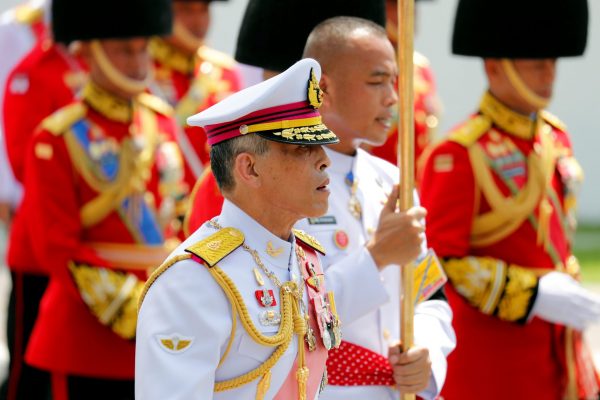Since coming to power in December 2016, the King has managed (with the help of the army) to gain direct control over key appointments that were at least formally under the elected government’s control, such as the Supreme patriarch (the head of the order of Thai Buddhist monks) and members of the Crown Property Bureau. These moves highlight a return to the 1960s, when the late King Bhumibol Adulyadej built his power through an alliance with military dictator Sarit Thanarat.
There is no doubt that 2017 witnessed a deepening of authoritarianism in Thailand. This is epitomised by two sets of legislative activity. First, the repressive ‘legal kit’ criminalising dissent is growing increasingly sophisticated. Second, the king and the junta are constitutionally engineering a semi- or ‘tutelary’ democracy characterised by a dual-state structure, providing for an elected government placed under the tutelage of the military and the monarchy.
A few days before the promulgation of the constitution, a historical plaque commemorating the 1932 revolution that overthrew the absolute monarchy was replaced by a plaque glorifying the current Chakri dynasty. Some alleged that the plaque was removed on palace orders, but this was hard to consider as discussion on the issue — including academic discussion about the plaque’s history and significance — fell under the lese majeste law. Six people who shared information on the plaque removal on Facebook were arrested for lese majeste.
Since the military coup in 2014, authorities have charged and jailed more than 100 people under the lese majeste law, under which bail pending trial is systematically denied. The law punishes whoever defames, insults or threatens the king, the queen, the regent or the heir-apparent with a 3–15 year jail sentence.
Thailand’s lese majeste law is today the harshest in the world — even more severe than it was at the time of the Siamese absolute monarchy, where the maximum sentence was seven years. The courts have handed down lese majeste rulings on a regular basis throughout 2017. The sentences have been up to 35 years for some defendants charged on multiple counts for sharing offending Facebook posts.
Beyond the protection offered by Article 112 to the royal family, other legal provisions protect the military and the courts. Article 116 protects the military from criticism, while a myriad of contempt of court laws shield the courts and court decisions, including the Constitutional Court, from any discussion.
This is particularly useful, as under the 2017 constitution, the Constitutional Court has significant powers to interfere in the democratic process. Its powers include the means to overthrow elected leaders, to dissolve political parties, to veto legislation before and after promulgation and to void constitutional amendments on both formal and substantial grounds.
Meanwhile, an array of judicial and quasi-judicial bodies specialising in the fight against corruption can easily initiate criminal prosecution and civil liabilities against (as well as outright remove) unwanted elected leaders — as was the case with former prime ministers Thaksin Shinawatra and his sister Yingluck. The Constitutional Court can almost initiate a case of its own accord since the constitution provides an individual the unfiltered right of petition before the Court.
The Senate (a body fully appointed by the military junta for a five-year term) can impeach elected politicians and ban them from politics for five years. In the event that no majority government is formed after an election, the Senate also participates in the appointment of the prime minister, who does not need to be an elected member of parliament.
The electoral system creates obstacles to any party that wins a majority in the National Assembly since it gives overwhelming bonuses to losing political parties. The junta has made the setting up of political parties especially difficult due to the requirement that parties have local branches covering the entire country. The near-impossibility of winning an election will likely lead to the Senate helping to nominate a prime minister who is loyal to both the king and the army – maybe Prayuth himself or a direct nominee.
Until a new government is sworn in, junta leader General Prayuth Chan-ocha retains unlimited legislative, executive and judicial power under Article 44 of the 2014 Constitution. Then, the National Strategy Committee (which is composed of 35 junta appointees) will still retain the power to take over the new government when it does not implement the Committee’s 20 year national strategy.
At best, the elections in 2019 will reshape Thailand’s dual-state structure, which collapsed in 2014 when the deep state absorbed the remnants of a democratic state. At worst, they will not take place at all. If this happens, maybe the worst will turn out the best if it means the military and monarchy’s authoritarian alliance does not hide behind the screen of a token elected government.
Eugenie Mérieau is a Post Doctoral Fellow at the Von Humboldt Chair of Comparative Constitutionalism, University of Göttingen.
This article is part of an EAF special feature series on 2017 in review and the year ahead.

